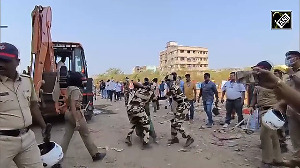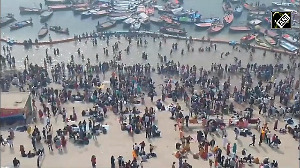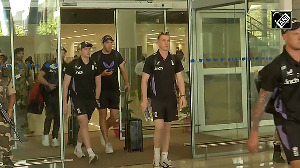Defence Minister A K Antony on Monday visited the historic Berlin War Cemetery and paid tributes to Indian soldiers who lost their lives during the Second World War.
As the bugler sounded the 'Last Post' at the war cemetery, Antony along with senior officials moved towards the memorials built at Berlin War Cemetery where bodies of 50 undivided Indian soldiers were laid to rest during the Second World War.
Antony, who is on an official visit to Germany, visited the cemetery yesterday and placed a wreath at the memorial on which 'Their Name liveth for ever more' was inscribed, at a simple ceremony.
Immediately after the arrival, a small detachment of the German Guards stepped forward to aid the minister to place a wreath at the Memorial. He showered rose petals as the bugler again blew the 'Last Post' signing the end of the mourning period.
Two priests chanted prayers as the delegation members placed rose stalks at the graves.
The Defence Minister, escorted by the Commonwealth Cemetery officials, then visited the place where the Indian soldiers were buried and whose pyres were lit.
In the cemetery record book, the defence minister wrote, 'I salute to the heroic memory of the Indian soldiers who sacrificed their precious lives.'
Berlin War Cemetery is located in the western part of the city. Almost 3,600 casualties from the Commonwealth countries are commemorated at this site. The majority are airmen who lost their lives in air raids over Berlin and the towns of Eastern Germany.
The remaining were men who died as prisoners of war, some of them in the forced march into Germany from camps in Poland, in front of advancing Russians.
A total of 162 soldiers of undivided India have been laid to rest in 17 locations in Germany. Of these, 50 have been commemorated in the Berlin War Cemetery. These soldiers belong to Indian Armoured Corps, Indian Artillery, Infantry, Royal Indian Army Service Corps, Madras Sappers and Miners, Indian Army Remount Corps and Indian Army Ordnance Corps.
The War Cemetery is maintained by the Commonwealth War Graves Commission. The cost of the maintenance is shared by the partner nations, including India.
The site for the Cemetery was selected by the British Occupation Authorities and Commission officials jointly in 1945, soon after the hostilities ceased. Graves were brought to the Cemetery from the Berlin area and from Eastern Germany.






 © 2025
© 2025